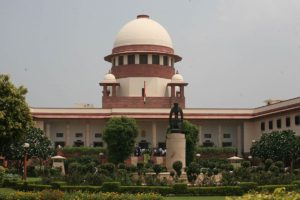In a recent judgment delivered by the Supreme Court of India ( Ramesh Rajagopal vs. Devi Polymers Private Limited), the Apex Court, while setting aside the order passed by the High Court, has reiterated the principles governing quashing of F.I.Rs. The Top Court has held that the powers under section 482 of the Code can be exercised in the following circumstances:
(1) Where the allegations made in the first information report or the complaint, even if they are taken at their face value and accepted in their entirety do not prima facie constitute any offence or make out a case against the accused.
(2) Where the allegations in the first information report and other materials, if any, accompanying the FIR do not disclose a cognizable offence, justifying an investigation by police officers Under Section 156(1) of the Code except under an order of a Magistrate within the purview of Section 155(2) of the Code.
(3) Where the uncontroverted allegations made in the FIR or complaint and the evidence collected in support of the same do not disclose the commission of any offence and make out a case against the accused.
(4) Where, the allegations in the FIR do not constitute a cognizable offence but constitute only a non-cognizable offence, no investigation is permitted by a police officer without an order of a Magistrate as contemplated Under Section 155(2) of the Code.
(5) Where the allegations made in the FIR or complaint are so absurd and inherently improbable on the basis of which no prudent person can ever reach a just conclusion that there is sufficient ground for proceeding against the accused.
(6) Where there is an express legal bar engrafted in any of the provisions of the Code or the concerned Act (under which a criminal proceeding is instituted) to the institution and continuance of the proceedings and/or where there is a specific provision in the Code or the concerned Act, providing efficacious redress for the grievance of the aggrieved party.
(7) Where a criminal proceeding is manifestly attended with mala fide and/or where the proceeding is maliciously instituted with an ulterior motive for wreaking vengeance on the accused and with a view to spite him due to private and personal grudge.
JSB Note:
The legal position is well settled that when a prosecution at the initial stage is asked to be quashed, the test to be applied by the court is as to whether the uncontroverted allegations as made prima facie establish the offence. It is also for the court to take into consideration any special features which appear in a particular case to consider whether it is expedient and in the interest of justice to permit a prosecution to continue. This is so on the basis that the court cannot be utilised for any oblique purpose and where in the opinion of the court chances of an ultimate conviction are bleak and, therefore, no useful purpose is likely to be served by allowing a criminal prosecution to continue, the court may while taking into consideration the special facts of a case also quash the proceeding even though it may be at a preliminary stage.
The criminal courts are clothed with inherent power to make such orders as may be necessary for the ends of justice. Such power though unrestricted and undefined should not be capriciously or arbitrarily exercised, but should be exercised in appropriate cases, ex debito justitiae to do real and substantial justice for the administration of which alone the courts exist. The powers possessed by the High Court Under Section 482 of the Code are very wide and the very plenitude of the power requires great caution in its exercise. Courts must be careful to see that its decision in exercise of this power is based on sound principles.
